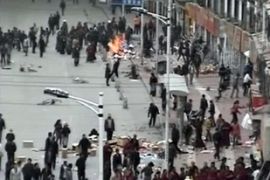China admits shooting protesters
Military build-up reported across western China as protests spread outside Tibet.

Published On 20 Mar 2008
The latest Chinese crackdown came after violent protests against China’s rule of the Himalayan region.
Military convoys
Georg Blume, a German journalist in Lhasa said: “We saw a big convoy of military vehicles with troops in the back.”
“One convoy was about two kilometres long and contained about 200 trucks. Each had 30 soldiers on board so that’s about 6,000 military personnel in one convoy.”
Blume, who works for the German newspaper Die Zeit, said he had seen security forces going from one house to the next.
| Your Views |
|
Could the Tibetan protests derail China’s plans for a smooth run-up to the Beijing Olympics? |
A week of protests against China’s 57-year rule of Tibet erupted into rioting in Lhasa last Friday.
Demonstrations have since spilled over into nearby Chinese provinces with sizeable ethnic Tibetan populations.
China said rioters killed 13 innocent civilians in Lhasa while denying that it used deadly force to end the protests.
Exiled Tibetan leaders say about 100 people have been killed in the Chinese crackdown.
The Dalai Lama, Tibet’s spiritual leader, on Thursday expressed concern for the many people he said had fallen victim to Chinese security forces.
“We don’t know exact numbers. Some say six, some say 100, but places have been cut off. There are movements of Chinese troops. I am really worried a lot of casualties have happened,” he said from exile in northern India.
Xinhua said security forces had shot and wounded four protesters “in self-defence” during protests in the remote county of Aba (known in Tibetan as Ngawa).
Differing casualties
However, activist groups say at least eight people were killed by security forces in the Aba protests.
They circulated photos this week of dead bodies with apparent bullet wounds to back up their allegations that Chinese forces were using lethal force despite official claims to the contrary.
The unrest has been a public relations challenge for China in the lead-up to the Beijing Olympics in August.
While no government has called for a boycott of the Games, China has faced increasing international pressure to resolve the unrest peacefully and to hold talks with the Dalai Lama.
On Wednesday the US state department said Condoleezza Rice, the US secretary of state, urged Yang Jiechi, the Chinese foreign minister, to open talks with the Tibet’s spiritual leader.
Possible talks
China has blamed the Dalai Lama for the violence and called him a “splittist” bent on Tibetan independence.
The Dalai Lama has repeatedly said that he does not want independence for his homeland, but instead seeks greater cultural autonomy under Chinese rule and an end to what he describes as widespread repression.
| In depth | |
|
He offered to meet with Hu Jintao, the Chinese president, and other Chinese leaders, but would not travel to Beijing unless there was a “real concrete development”.
Gordon Brown, the British prime minister said on Wednesday that he planned to meet with the Dalai Lama and encourage Wen Jiabao, the Chinese premier, to do the same.
Brown’s remark triggered a swift response from Beijing which said it was “seriously concerned” by a possible meeting.
On Thursday a White House spokesman indicated that plans by George Bush, the US president, to attend the Beijing Olympics would not be influenced by Tibet.
“The president’s position about the Olympics has been that this is not a political event but a chance for athletes to compete at the top of their class,” said Dana Perino.
China has banned foreign journalists from Lhasa and tried to block them from riot-hit nearby western provinces of China.
Authorities have arrested 24 people linked to the protests in Lhasa, while 170 people have surrendered to police, Xinhua reported.
Activist groups say hundreds of Tibetans have been arrested.
Source: News Agencies
